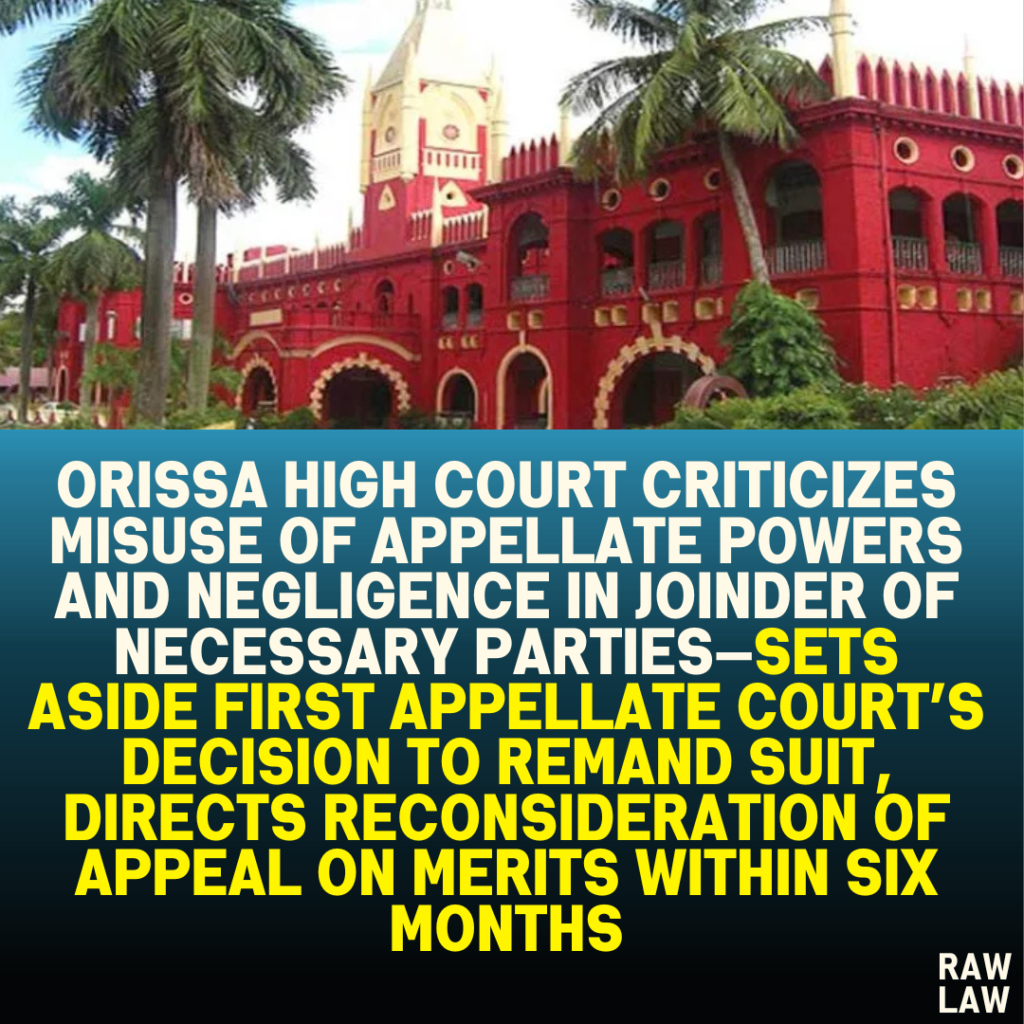Court’s Decision:
The Orissa High Court set aside the order of the First Appellate Court which had remanded the suit for fresh adjudication and directed the impleadment of a new party at the appellate stage. The High Court emphasized that negligence in adding necessary parties should not be corrected at a later stage, especially when objections regarding non-joinder were raised early in the proceedings. The appeal has been remitted back to the First Appellate Court for fresh disposal in accordance with the High Court’s observations.
Facts:
The suit was originally filed by the plaintiffs in 2004 in the Court of Civil Judge, (Junior Division), Athagarh, seeking declaration of their right, title, and interest over the disputed land. They also sought a permanent injunction to restrain the defendants from interfering with their possession or, alternatively, recovery of possession if they were found dispossessed during the suit’s pendency. The plaintiffs claimed to have inherited the suit land from their predecessor, who had purchased it through a registered sale deed. However, during a settlement operation in 1985, only a portion of the land was recorded in their name, leading to an alleged encroachment attempt by the defendants.
In response, the defendants filed a joint written statement, asserting that the suit was bad for non-joinder of necessary parties, specifically other co-owners of the disputed plot. They contended that the plaintiffs failed to implead all the persons with a joint interest in the property, making the suit liable for dismissal. The trial court dismissed the suit, concluding that the plaintiffs had not proved their right, title, and possession over the entire suit land.
The plaintiffs appealed before the First Appellate Court, which, in turn, allowed the appeal and remitted the case to the trial court, permitting the plaintiffs to file a consolidated plaint by adding a new party and proving certain rent receipts through additional evidence.
Issues:
- Whether the suit was bad for non-joinder and mis-joinder of necessary parties.
- Whether the plaintiffs had any right, title, and interest over the suit land.
- Whether the defendants threatened to invade the plaintiffs’ right to possession of the suit property.
- Whether the plaintiffs were entitled to recover possession of the suit property.
Petitioner’s Arguments:
The appellants contended that the First Appellate Court erred in allowing the plaintiffs to implead a new party at the appellate stage when the issue of non-joinder was known and raised from the inception of the proceedings. They argued that allowing the plaintiffs to rectify this error at such a stage amounts to “patching up” their case, which is against the principles of law. They also submitted that the additional evidence of rent receipts had no bearing on the plaintiffs’ right to possession and was wrongly admitted.
Respondent’s Arguments:
The respondents supported the First Appellate Court’s decision, arguing that once a new party is added at the appellate stage, remanding the suit for fresh disposal is a necessary consequence. They contended that the order allowing the plaintiffs to prove rent receipts was justified since possession was a crucial issue and these documents were relevant to establish the same.
Analysis of the Law:
The High Court highlighted the legal principle that negligence in impleading necessary parties should not be corrected at a later stage, especially when the issue was brought to the notice of the plaintiffs early in the proceedings. Citing Order 1 Rule 9 and Order 1 Rule 13 of the CPC, the court stated that objections regarding non-joinder should be taken at the earliest opportunity, and if such objections are ignored by the plaintiffs, they cannot be allowed to rectify the error in appeal. It emphasized that remanding the suit merely to rectify such lapses would go against the settled principle that “law helps the diligent, not the indolent.”
Precedent Analysis:
The court referred to a previous judgment, where it was held that a suit should not be defeated for non-joinder, but this rule does not apply if the defect was known from the beginning and the party had ample opportunity to remedy it. The High Court also relied on a similar case where it was held that if a suit suffers from non-joinder, the appellate court cannot fill the lacuna by remanding the case to the trial court.
Court’s Reasoning:
The High Court found that the First Appellate Court misused its powers by allowing the plaintiffs to patch up their case. It held that adding a new party at the appellate stage, when objections were known at the trial stage, was erroneous. Additionally, it ruled that allowing new evidence without giving the defendants an opportunity to rebut the same was against the principles of natural justice. The High Court clarified that while additional evidence can be admitted under Order 41 Rule 27, it should not be used to make up for deficiencies in the plaintiffs’ case.
Conclusion:
The High Court set aside the First Appellate Court’s order directing the addition of a new party and remanding the suit for fresh disposal. However, it remitted the case back to the First Appellate Court to reconsider the appeal on merits, giving both parties an opportunity to adduce further evidence if necessary. The High Court directed the First Appellate Court to conclude the matter within six months, ensuring no unnecessary adjournments are granted.
Implications:
The judgment reaffirms that negligence in impleading necessary parties cannot be remedied at a later stage if objections were raised early in the proceedings. It also underscores the importance of ensuring that additional evidence is not used to cover up a party’s lapses. The ruling will have a significant impact on cases involving mis-joinder and non-joinder of parties, providing clarity on the appellate court’s powers in such matters.
